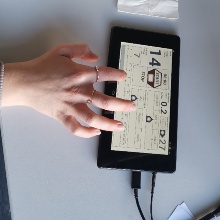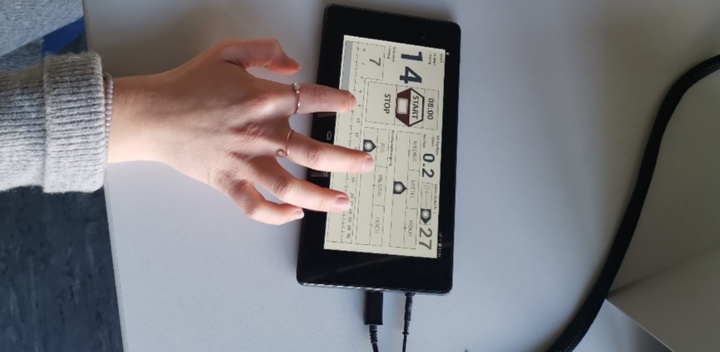The use of touch screens is often difficult, especially for older people, since the information is captured primarily with the eye, but not with the sense of touch. Researchers at the Institute for Engineering Design and Industrial Design (IKTD) at the University of Stuttgart are now developing a technology that can be used to “feel” the information on the touch user interface by means of electrostatic fields. In order to try out the different feedback patterns, test subjects are wanted.
Whether it’s the on-board computer in the car, the stove, the heating system, or agricultural machinery: More and more devices in the consumer and capital goods sectors are no longer operated with buttons and switches, but via audiovisual displays, especially via touch screens. However, most displays send their information as signals that can be seen or heard. On the other hand, one of the most basic human senses, haptic perception (sense of touch), remains largely neglected. This makes the operation of devices more complex, the ability to perceive and process information is overloaded. As a result, safety-relevant situations can quickly become dangerous.
Particularly people from the age of 60 are confronted with this problem, be it at home (“smart home”) or on the go, for example in a car or at a ticket machine. The reason is because eyesight and hearing deteriorate with age, and there is also a decrease in cognitive performance. Both accelerate the overload.
Against this background, the Stuttgart researchers are investigating how the haptic perception channel can be used to relieve people in an ageing-appropriate manner, as part of a research project entitled “Ageing-appropriate adaptive electro-tactile touch user interfaces in translational use”. The project, funded by the German Research Foundation (DFG) with a total of EUR 180,000, aims to design a haptic human-machine interface and relies on an electro-tactile touch user interface.
Friction between the touch screen and the finger
Here, the touch screen is encoded using electrostatic fields that interact with the water molecules in the finger. If you now run your finger over the touch user interface, the friction between the touch screen and the finger changes.
In order to investigate how users perceive and react to the fields, a slider is implemented on a touch screen and provided with the electro-tactile feedback. It is examined whether the test subjects perceive, for example, an increase or decrease in feedback of a marking at a certain slider position, or even a scale by means of electro-tactile stimulus. For this purpose, the position of the electrostatic fields, as well as their extent and intensity, are varied.
The aim is to gain new insights into how certain features of an electro-tactile touch user interface can be coded in order to cope with the ever-increasing flow of information. Multi-modal ways of transmitting information are intended to relieve the visual perception channel, especially in older people, by supporting tactile information transmission. In addition, age-related sensorimotor losses, which often also affect tactile information processing in the elderly, are to be compensated in order to ensure a more comfortable, efficient, and effective human-machine interaction.
Wanted: test subjects from different age groups
To test the various tactile feedback patterns, the researchers plan to conduct a user study in early summer 2020. Both young and older participants are being sought. The tests will be conducted in the laboratory of the Institute for Engineering Design and Industrial Design, 9 Pfaffenwaldring, in Stuttgart-Vaihingen. If you are interested, please contact Peter Schmid, peter.schmid@iktd.uni-stuttgart.de, for information and registration.
Expert Contact:
Prof. Thomas Maier, Peter Schmid, University of Stuttgart, Institute for Engineering Design and Industrial Design, Research Specialists and Lecturers in Industrial Design, phone: 0711 / 685-66060, -66650, email: thomas.maier@iktd.uni-stuttgart.de, peter.schmid@iktd.uni-stuttgart.de



